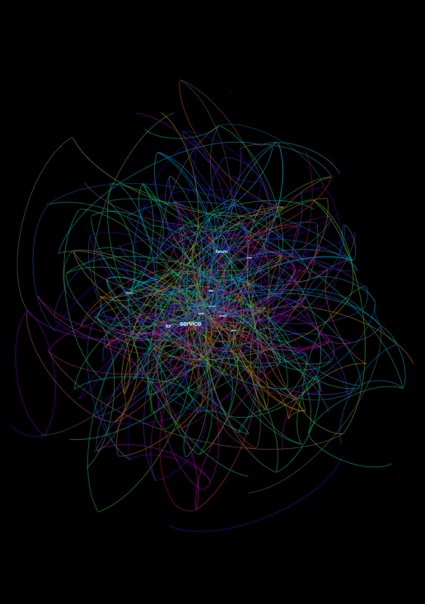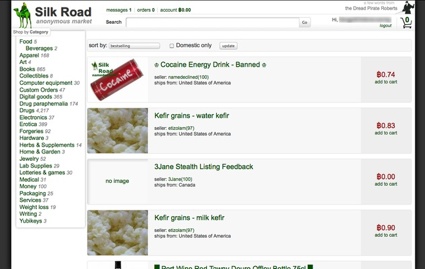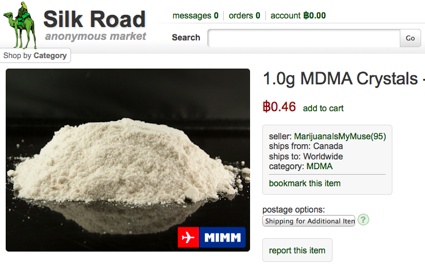A few weeks ago, Sight and Sound, a festival produced by Eastern Bloc in Montreal, ran a workshop titled Analyze Dat: TOR Visualization. Headed by someone who presents himself (or herself) as Arthur Heist, the description of the workshop suggested an internet driven by secrecy.
This workshop explored the use of natural language processing tools to analyze the goods, products and services available on online black markets, trying to reveal a faithful cartography of the dark web.
The workshop will begin with an introduction of the tools involved in accessing the Internet’s black markets (Tor bundle, Bitcoins). Participants will then process these webpages to extract information from natural language to draw a map of hidden services. These tools allow the user to go from simple word frequency analysis (i.e. cloud tags) to more complex semantic comparison and statistical relationships between those networks. The goal is to be able to visualize this data in order to get a better understanding of the inner, deep feelings society keeps hidden.
 Word visualization of the hidden wiki made during the workshop. Image courtesy Arthur Heist
Word visualization of the hidden wiki made during the workshop. Image courtesy Arthur Heist
I knew about the stateless, encrypted online Bitcoin currency of course, i had heard of the Tor software that enables online anonymity but other than that, i felt that there was precious little i knew about the Deep Web, the vast submersed side of the World Wide Web that countless people are using in perfect anonymity every day to buy goods that neither ebay nor amazon will ever sell you and to exchange services that won’t appear when you do a google search.
The more i looked into Tor and the many activities it enabled, the more intrigued i was. I thought that the easiest and fastest way to get a better understanding of the issue would be to interview Arthur Heist:
HI Arthur! How much can one discover about this underground economy ?
It is quite easy to find out about any good or hidden service available on the dark web. One just needs to know the first entry point that keeps track of these peculiar services.
Do you have to be a seasoned hacker, a super smart programmer or can any web user make interesting enough discoveries ?
The first pit stop is to go to the Tor project website and install the Tor browser for your operating system. Once installed, you can launch Tor browser and access any website anonymously. So, no need to be either a hacker or programmer to begin browsing the hidden web. A popular place where a lot hidden services are listed is “The Hidden Wiki“. From there, you can even find search engines that specifically target onion websites (those with an cabalistic URL).
And how did you find about it in the first place ?
As a user, I had been using Tor for a few years to enhance my anonymity online. I like the fact that it allows you to bypass some restrictions applied unfairly by companies who want to protects their assets. In a way, Tor gives us back the net neutrality some companies or governments want to put at risk. Concerning the dark web more specifically, this whole economy emerged more recently as a result of the emergence of bitcoin currency approximately 4 years ago. Even though I did not get interested in bitcoin specifically, I was more fascinated by the whole range of services and activities made available by these new technologies.
 Screenshot of an item description page on the Silk Road Marketplace
Screenshot of an item description page on the Silk Road Marketplace
 Screenshot of some of Silk Road‘s offerings, with its price marked in Bitcoins
Screenshot of some of Silk Road‘s offerings, with its price marked in Bitcoins
Deep web, Silk Road, etc. Do you feel that the general public is quite unaware of the existence of this less visible part of the web ?
From a general point of view, I have never thought that the internet was much different or more dangerous than what we can experience in the real world. Let’s say you are going to Toronto for the first time and you want to buy some crack cocaïne, where do you go? Who do you get in contact with? In the same manner, if you want to find illegal services on the web, it takes the same effort to know about them.
The general public has been fed what commercial companies want them to know. They have their minds locked in a narrow place for them to consume more easily, in the same way they’d go to Starbucks instead of the local coffee shop because it’s not advertised on the same scale.
Were the participants like me, attracted by the description of the workshop but totally unaware of what it entailed? Or did they come prepared and knowing what they would be looking for ?
The nice thing about the participants was that they represented in their interests the whole range of topics discussed during the workshop. Some were more interested in the political issues involved, some more in the use of natural language tools. Most of them had already installed Tor on their computers.
How exactly does this online black market reflect the traditional offline black market ?
As stated above, there are no major differences between what you can find through online or offline black markets. And as a matter of fact, in the offline black market, anonymity is also the rule, going from changing your real name to wearing disguises so as not to be recognized. The main added value that the online black market allows for is the possibility to connect dealers and customers that would not have met otherwise in real life, which is also the main characteristic of online services in general too.
Does it allow for other types of transactions, activities, exchanges of goods and services?
Of course, anonymity brings a wide range of activities that you would not be able to find if it weren’t anonymous. Among things you can find through hidden services are the scary contract killers who offer to kill someone, whose prices are set depending on the popularity of the person to kill. A funnier website called Tor University offers you to write any assignment or essay you need to get better grades. Another website offers to set up pranks to your friends; for example, by breaking into their house with a fully equipped SWAT team …
I read that law enforcement agencies were struggling to deal with online black market. Why is it even more difficult to grasp and fight than, say, traditional drug traffic?
Because of the inner nature or how Tor works, by encrypting the communications being sent, all along the way through each relay (except for the last one), it is not easily possible to track down one specific user or website. Nevertheless, one famous hack was made possible on the Tor network by setting up a few Tor routers, which all relay a lot of information. Most of it is encrypted, but when the router is chosen (by the algorithm itself) to act as the last relay, then the data being transited is sent in the clear. So, if you set up your own relay, you are able to log all data transiting on your node, and thus retrieve information people have not encrypted before sending it through the Tor network. Tor network offers anonymity, not confidentiality! I read there also were some rumors that US governmental agencies may possibly run fake drug websites, so as to be able to get an alarm when some user was buying a too large amount of drugs for it to be his personal consumption.
Can the dark web (the way it operates, protects itself, etc.) teach innocent users of the internet (like me) anything ?
Blatantly, recent news about the US Prism program shows us again that giving up your personal data into the hands of big internet companies is like leaving your luggage in your hotel lobby: how trustworthy is it, you can never be sure it won’t be stolen or searched by anyone. And what the Tor network (and as an extension, bitcoins) achieves is the possibility to give us back the power to build the internet as it should, free and open. Of course, mass media like to make us think the use of these tools is evil and unsafe, whereas it is indeed the safest thing to do.
What did the participants achieve during the workshop ?
The workshop was more about awareness, discussion and showing how these various tools work and how to use them in your own practice.
Thanks Arthur!
Also part of Sight and Sound, a Montreal festival which, this year, explored the rhizomatic and permeating structures of society’s concealed systems: The Pirate Cinema, A Cinematic Collage Generated by P2P Users.
